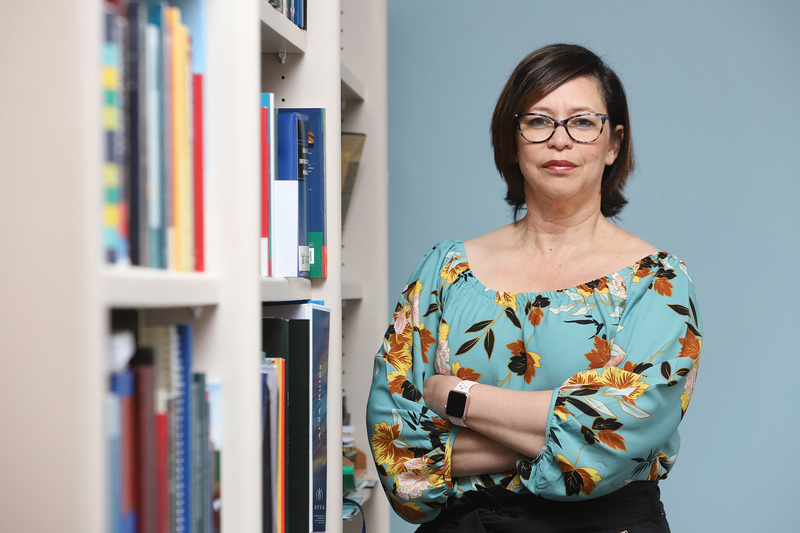What you need to know about coming to UCT in 2021
18 December 2020 | Professor Loretta Feris
Dear students and colleagues
The University of Cape Town (UCT) is already preparing for the 2021 academic year and we are looking forward to welcoming back returning students and helping first-year students to feel at home on campus.
While COVID-19 is still with us, we all need to learn from the lessons of 2020. We’ve seen how difficult it was for many of our students to learn remotely for various reasons, including their social conditions. For safety reasons, UCT will adopt physically distanced learning next year, but in a way that will allow students to benefit from the resources available here. So it’s important that students return to campus in 2021, even if they will be working online. We are working hard to help everyone to succeed.
UCT residences will open on 25 February 2021 for postgraduate students and on 1 March for new and returning undergraduate students.
Some students will be permitted to return to residence earlier, to complete their requirements for the 2020 academic year. To limit the spread of the COVID-19 pandemic, UCT is organising single-room residence accommodation and a ‘safe arrival’ quarantine period. If students become a close contact of a person who has tested positive for COVID-19, we will follow the ‘close contact quarantine period’ as prescribed by the Department of Health.
Limiting the spread of COVID-19 is a responsibility we all share
All students, staff members and visitors to UCT will be required to abide by the health and safety procedures and protocols on campus. These protocols are designed to help everyone adhere to the four basic rules:
- Wear a mask over your mouth and nose in public, including when you leave your residence room (UCT will provide every staff member and student with cloth masks)
- Keep a distance of at least 1.5 m from other people
- Sanitise your hands or wash them frequently with soap and water
- Avoid crowded places and spaces with poor ventilation
Health support is available for students
The Student Wellness Service (SWS) in the Department of Student Affairs will continue to provide pandemic-related support to students, including screening for symptoms on arrival to residence and providing information about the prevention of COVID-19 infection before arrival. UCT’s responses to COVID-19, and the answers to frequently asked questions, are available on our dedicated web page.
- Read the FAQs and other information about UCT’s responses to COVID-19
- Read the COVID-19 support plan for UCT students
The SWS offers primary health care and medical, counselling and social work services, including:
- 24-hour Students COVID-19 Hotline: 021 650 1271
- SWS Triage Line: 021 650 5620
- Sexual Assault Emergency Standby Number: 072 393 7824
- Online booking for a SWS medical appointment for any health query
Students will need laptop computers in 2021
For students to receive the full value of UCT’s physically distanced learning in 2021, they will need to have access to their own laptop computers, which will allow them to access online teaching and academic support resources 24/7.
UCT is preparing study spaces on campus that will meet the health and safety protocols under COVID-19 conditions.
These spaces will be clearly marked to indicate the maximum number of occupants to comply with physical distancing requirements. Students using UCT venues and other facilities are required to follow the prescribed rules and regulations and to co-operate with students and staff in observing these limitations.
Students will be informed about what documentation they will need to carry to be allowed on campus in 2021.
While UCT remains an open campus, access points are limited to allow our Campus Protection Services to screen everyone who visits the university, as part of our health and safety precautions.
I wish each of you a restful holiday and a safe arrival to UCT next year.
Sincerely
Professor Loretta Feris
Deputy Vice-Chancellor: Transformation
Read previous communications:
 This work is licensed under a Creative Commons Attribution-NoDerivatives 4.0 International License.
This work is licensed under a Creative Commons Attribution-NoDerivatives 4.0 International License.
Please view the republishing articles page for more information.
UCT’s response to COVID-19
COVID-19 is a global pandemic that caused President Cyril Ramaphosa to declare a national disaster in South Africa on 15 March 2020 and to implement a national lockdown from 26 March 2020. UCT is taking the threat of infection in our university community extremely seriously, and this page will be updated with the latest COVID-19 information. Please note that the information on this page is subject to change depending on current lockdown regulations.
Minister of Health, Dr Joe Phaahla, has in June 2022 repealed some of South Africa’s remaining COVID-19 regulations: namely, sections 16A, 16B and 16C of the Regulations Relating to the Surveillance and the Control of Notifiable Medical Conditions under the National Health Act. We are now no longer required to wear masks or limit gatherings. Venue restrictions and checks for travellers coming into South Africa have now also been removed.
Read the latest document available on the UCT policies web page.
Campus communications
2022
UCT Community of Hope Vaccination Centre
On Wednesday, 20 July, staff from the University of Cape Town’s (UCT) Faculty of Health Sciences came together with representatives from the Western Cape Government at the UCT Community of Hope Vaccination Centre at Forest Hill Residence to acknowledge the centre’s significance in the fight against COVID-19 and to thank its staff for their contributions. The centre opened on 1 September 2021 with the aim of providing quality vaccination services to UCT staff, students and the nearby communities, as well as to create an opportunity for medical students from the Faculty of Health Sciences to gain practical public health skills. The vaccination centre ceased operations on Friday, 29 July 2022.
With the closure of the UCT Community of Hope Vaccination Centre, if you still require access to a COVID-19 vaccination site please visit the CovidComms SA website to find an alternative.
“After almost a year of operation, the University of Cape Town’s (UCT) Community of Hope Vaccination Centre, located at the Forest Hill residence complex in Mowbray, will close on Friday, 29 July 2022. I am extremely grateful and proud of all staff, students and everyone involved in this important project.”
– Vice-Chancellor Prof Mamokgethi PhakengWith the closure of the UCT Community of Hope Vaccination Centre, if you still require access to a COVID-19 vaccination site please visit the CovidComms SA website to find an alternative.
Frequently asked questions
Global Citizen Asks: Are COVID-19 Vaccines Safe & Effective?
UCT’s Institute of Infectious Disease and Molecular Medicine (IDM) collaborated with Global Citizen, speaking to trusted experts to dispel vaccine misinformation.
If you have further questions about the COVID-19 vaccine check out the FAQ produced by the Desmond Tutu Health Foundation (DTHF). The DTHF has developed a dedicated chat function where you can ask your vaccine-related questions on the bottom right hand corner of the website.
IDM YouTube channel | IDM website
“As a contact university, we look forward to readjusting our undergraduate and postgraduate programmes in 2023 as the COVID-19 regulations have been repealed.”
– Prof Harsha Kathard, Acting Deputy Vice-Chancellor: Teaching and Learning
We are continuing to monitor the situation and we will be updating the UCT community regularly – as and when there are further updates. If you are concerned or need more information, students can contact the Student Wellness Service on 021 650 5620 or 021 650 1271 (after hours), while staff can contact 021 650 5685.




















